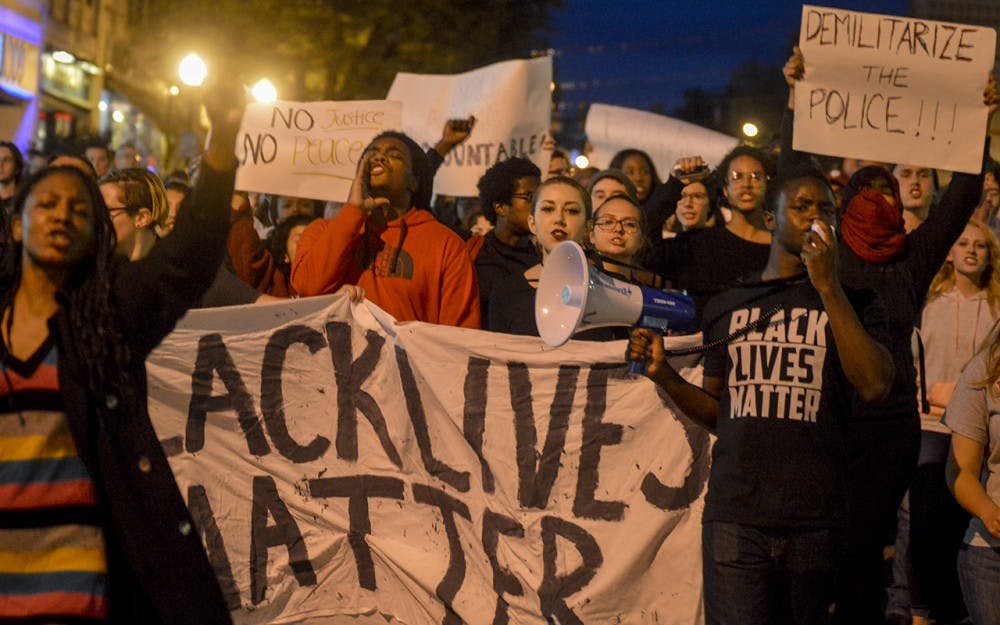Drivers accelerated onto the Third Street sidewalk, directly at those protesting in a circle at the intersection just outside the Bloomington Police Department. Young women and men, gripping posters inscribed with names of black lives lost, darted to block the vehicles.
Red lights shifted to green on the faces of hundreds gathered in a circle for the culmination of Monday night’s Black Lives Matter demonstration.
Supporters’ dogs barked. Car horns blared.
“Back up. Back up,” the crowd chanted. “We want freedom, freedom. All these racist-ass cops, we don’t need ‘em, need ‘em.”
Indy10 Black Lives Matter organizer Hannah Aletheia diffused on disgruntled driver after another as IU graduate student Andrea Sterling spoke about racialized police violence, institutional racism and the case of Joseph Smedley.
The march flowed to this location through the streets from the rally’s origin, the Sample Gates.
Students Against State Violence and the Black Student Union hosted the demonstration, where campus and regional social justice groups, white-haired women, small children and countless others rallied for justice.
SASV is an anti-capitalist student group in opposition to poverty tied to white supremacy, policing, militarism, gender violence, deportation and the prison system.
The BSU works to improve quality of life for black students by raising awareness of their interests through educational and social programs. BSU President Kealia Hollingsworth spoke first.
She faced a crowd holding balloons with tags displaying the names of people of color who had been killed.
“We are human,” Hollingsworth said. “Our experiences are real.”
She said other people have to see that. She said there is something wrong with the fact that many of IU’s black students must immerse themselves in the campus black community to feel any semblance of support, that each freshman is charged with the endless duty of standing up as an advocate.
“If not us, who will?” she asked.
Bella Chavez, another speaker, said she would. She said she, too, had been a victim of prejudice and police brutality.
After a childhood of calling police for protection on the South Side of Chicago and in Elkart, Indiana, after years of learning she could not rely on that protection, Chavez checked her phone to see several missed calls from her mother. It was June 2016.
When Chavez called her back, she heard fear on the other end of the line.
Officers in Oklahoma City had shot and killed her uncle Miguel on a city bus.
Chavez said she had never seen her father cry before that or seen her grandmother so angry. Her cousins had lost their father.
“The cops don’t work for us,” she said. “The government doesn’t work for people like us.”
Yassmin Fashir said she goes to class every day knowing this institution is not made for her.
She said education systems don’t teach that white people have bent black bodies to stand upon. They teach that Africa is a place of disease and starvation.
Born in Darfur, she knows otherwise. Having lived in Indiana for years, she knows better than to believe white people deserve everything they claim. She called for more action from white allies.
“This goes beyond this rally,” she said.
The final Sample Gates speaker Stanley Njuguna pointed at a woman in the crowd.
“It lives in us,” he said. “And it lives in you.”
He urged everyone before him to recognize the LGBT, female and disabled members of the black community, who have often gone ignored in the Black Lives Matter movement.
“Then, and only then, do mountains begin to move,” he said. “We are marching to triumph.”
Njuguna instructed everyone to release their balloons, and as they floated to the dimming sky, everyone began to march.




